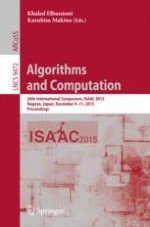2015 | OriginalPaper | Buchkapitel
Game Values and Computational Complexity: An Analysis via Black-White Combinatorial Games
verfasst von : Stephen A. Fenner, Daniel Grier, Jochen Messner, Luke Schaeffer, Thomas Thierauf
Erschienen in: Algorithms and Computation
Verlag: Springer Berlin Heidelberg
Aktivieren Sie unsere intelligente Suche, um passende Fachinhalte oder Patente zu finden.
Wählen Sie Textabschnitte aus um mit Künstlicher Intelligenz passenden Patente zu finden. powered by
Markieren Sie Textabschnitte, um KI-gestützt weitere passende Inhalte zu finden. powered by
